- Home
- Deck Davis
Rise of the Necromancer
Rise of the Necromancer Read online
CHAPTER 1
The Caravan
The sun was glorious on the day that 103 men, women, and children vanished. It wasn’t just a sunny day, but a cheery one. Ridiculously cheery. The kind of cheery that you wouldn’t expect from folk who were arse-deep in the most hostile place in the queendom but then, they had no forewarning of what was to come.
Even if they had, would they have listened? These folks had learned to ignore the danger they were in. Like a lion tamer who has gone decades without being eaten, every journey into these harsh lands made them less respectful of its dangers.
That’s not to say they were slackers. Far from it; they worked hard, and that meant when they got a break, they’d earned it. Whenever the caravan stopped for a while, guitars and lutes were brought out.
Wagon drivers sat on upturned buckets and they oiled the wheels of their carts and drank water from pigskins. Musicians tuned their instruments until the twangs started to sound more pleasing and chords thrummed out the way they should. Kids roamed the surrounding barrens and collected cactus leaves, fruit, and flowers while staying alert for darkened patches of sand that spoke of water.
It was the prospect of music that most were excited about, and the musicians didn’t have egos about their tunes. Come one come all was their attitude; if you want to join the song, then do it.
With one arm around her baby, a mother listened to the opening lyrics of a song and tried to find her place in it, adding her voice when the bard reached the chorus. Sitting on a half-barrel, a mercenary ran a whetstone along his blade, and he recognized a lyric and sang in a soft, self-conscious voice.
Banned from usual childish games due to potential for water loss through sweating, four boys and a girl crowded around the lute player and made up their own words, which the bard tried his hardest not to grin at them.
While the others sang, four hired warriors were gathered around an empty weapons box-turned-makeshift-table, playing a game of caravan craps.
They’d started with four equal piles of coins, but one pile grew taller than the others so that soon it resembled a tower ready to topple under its weight. After one unfortunate tumble of dice, a pony-tailed mercenary banged the table.
“Keep cheatin’, Alec. Keep doing it and see what happens. You’re dicing with death.”
His fellow players laughed, and Alec was the loudest. He brayed so long he lost his breath, and when he recovered it he was red-faced.
“Did your ma never sit you down and explain you got the brains of a cow and a face like its arse? Dicing with death? I’m dicin’ with…well…dice. If you keep letting bison shit plop outta that mouth I’m gonna dice you up. I’ll feed you to the bison and wait at their rear ends with a bucket and say hello to you when you come out. Then we’ll see who’s good at craps.”
Before long both the guitar and the lute on the opposite sides of camp played in harmony. Boots stomped out a rhythm to match them, sending a vibration through the caravan that worried one bison and made it back away a step. The bison tied to it didn’t move, because this was an old animal well used to the strange dances of its masters.
Like bees swarming around their honeycomb nest, more and more folks latched onto the song and sang the lyrics. Out of rhythm at first, but slowly moving into one until a unified ditty played out over Sun Toil, the music soothing the desolate cracks of desert that rarely heard sound.
They sang of pastures green and skies grey, because blue skies were plentiful out here and a person traveling Toil dreamed of clouds. They sang of days before the kingdom became a queendom and they sang about the days after. They sang words rarely heard out there in the bleak endlessness of Sun Toil.
“Five minutes,” bellowed a voice so loud that it snatched the music out of the air.
Wheel oilers spun their spokes and listened for good health. The mother sent her children back to the kids’ wagon. The mercenary ran his finger over his sword as if it were the naked spine of a lover lit under the moonlight.
A figure strode through the center of the camp, snapping an order here, casting a perfectionist gaze there.
“Don’t groan at me you lousy set of bastards,” said Gunar with a smile on his face, as the caravaners packed up their instruments. “I never promised you days by the beach. We’ll have a longer break when we make Equipoint Rock. You can celebrate like it’s your birthday when I see old Equi sticking out of the ground.”
Not many people traveled the desert, but those who did always looked out for the rock formation they called Equipoint, given that it usually signaled the halfway mark of Sun Toil, depending on your route.
The closer it had gotten, the more camp spirits had risen. Everyone knew that Gunar, as rigorous as his preparations had been, was superstitious about the rock and would always stay the night underneath it and make everyone in his company drink a toast or several to good fortune.
Toasts meant rest. They meant increased water and food rations for one night. Even wine and ale!
This was a special bonus since Gunar banned beer and wine because of their dehydrating effects…not that it stopped anyone. If you watched the Toil travelers, they would all seem to have strange, bottle-shaped right forearms. You might think that they had hidden something in their sleeve so their leader didn’t see. How about that, huh? But Gunar wouldn’t stop them partaking when they reached the big, beautiful rock. Everyone looked forward to the first sighting of old Equi.
The caravan spotters, who rode on the roofs of the foremost wagons and scanned the horizon for water, food, and danger, spent the whole day before reaching Equi with their hands against their forehead to block the sun. These were usually teenagers; boys and girls apprenticed to the caravan master.
“First to spot Equipoint gets five gold,” shouted one spotter.
“Make it ten and a night with your sister,” said another.
“Make it a broken nose and eating soup for the rest of your life,” replied the first.
Every so often a mercenary would slap his horse’s arse and ride level with the frontline wagons. They’d always look up at the spotters. “Boy,” the mercenaries would say. It was always boy, lad, or more patronizing names when they spoke to the spotters, even the girls. “Any sign of Equi?”
“None.”
“You tell me first, you hear? There’s a bronze in it for you.”
“Got it.”
And then the mercenary would retreat to his assigned position in the company, careful not to draw the gaze and rebuke of the caravan master.
Shortly after, only minutes, a different mercenary would ride to the spotters. Another deal would be made, even more bronze would be promised. Then yet another mercenary would approach them. The spotters would make these trades for the whole day until they were promised a gold coin.
“Idiots,” said one spotter, after a mercenary had left them. “Why do they all need to know first?”
“The captain has first-come-first-serve on watch duty times,” answered the other. “Nobody wants to be on watch when we’re celebrating, but they can’t call their time until we see Equi. First to notice it will get to make sure he doesn’t pull duty during the sing-song later.”
“You know, almost every merc’s been up to us. Except for him. The weird one.”
The boy jerked his thumb to the far-right of the wagon fleet. Right and behind them some, to where a driver sitting at the front of a cart raised his reigns and then lashed them down. The four horses in front of him picked up their pace.
Next to the driver was a man. He wasn’t an apprentice to the driver, and he wasn’t a trader. He was a mercenary in the respect that he was being paid for his services on this journey rather than being part of the caravan permanently, but he wasn’
t like the other mercs.
The first few days in Sun Toil, the stranger had stubbornly worn his black coat. When the heat finally overcame him, he shed it and rolled up the sleeves of his shirt, revealing arms that although weren’t big, bore the toned look that suggested some fighting training. He said little to the rest of the caravaners. He was pleasant enough if you engaged him, but he never offered his own a branch of conversation. Whenever they stopped for a water break, he looked out on the rest of the camp with deep, sad eyes, ones that looked like they’d seen a lot of darkness and soaked it in, and sometimes it looked like it was going to spill out.
Even with that, he gave off a goodness. The spotter found it difficult to explain why. If his gaze was dark most of the time, then he could only describe this goodness as light. A shroud of common decency that seemed to hang around the stranger.
“Why does he sit with the drivers?” said the other spotter. “Bunch of thieves and crooks.”
The driver of his cart looked back at them in disgust. The spotter shrugged.
His friend answered. “A thief once does not a thief always make,” he said. “Drivers get treated like shit. They get their water last. When we’re having breaks, they’re heaving inventory around, redistributing weight. They’re cutting open grain sacks, sharing it out. They’re diggin’ stones out of horse hooves. Maybe the necro thinks they could use some friendly company. I’ve seen him sit with a different driver every day.”
“Gunar hires criminals because they’re cheap. Don’t mean you can trust ‘em.”
“He won’t hire anyone who’s hurt a man. Just thievin’ and the like. There are plenty of reasons a man might steal.”
“Is that what the necroprancer told you? I saw you talking to him the other day.”
“Necromancer,” corrected the spotter. “You want to be careful who you mock, ‘cuz sometimes it’s your own tongue that chokes ya. Only thing I got out of the mancer was a smile and a good morning.”
“Best you leave it at that. If necromancers speak too much, their words call out to the dead. That’s why he acts like words cost gold. He doesn’t want to say too much and accidentally raise an army of zombies.”
“Idiot. He doesn’t speak because of all the shit that happened in Dispolis.”
“Huh?”
“You been sleeping with your head up your arse for a year? A bunch of crazy bastards were kidnapping academy kids and cutting their fingers off and stuff.”
“Why?”
“Well…they’re crazy. That explanation enough for ya? Crazy don’t need a why. Our necro had something to do with it.”
“And Gunar’s letting him travel with us? The hell?” said the spotter, looking worriedly at his fingers.
“No, idiot. You got wyrms nesting in your skull or something? He weren’t part of the torturing. He was caught up in it. They almost got him. That’s why he’s here with us, and not out raising rich folk from the dead like all the other academy necromancers.”
“I wouldn’t turn my back on him when the moon’s full. Hope Gunar’s staying wary.”
The spotter shrugged. “They say he helped Gunar’s girl. Necro was passing by when we was camped outside Leercroft, and he saw little Beate sitting beside Old Shep, crying.”
“That mutt is older than the gods, I swear.”
“Well, he’d reached the end. Dropped down dead.”
“Bullshit. He’s over there on a wagon with Beate. That dog will outlive the stars. Don’t talk shit.”
The driver shot the spotter a stern glance. This driver had a long ponytail of oil-black hair, and his skin was so ravaged by the sun he looked like bleached leather. His stare was enough to stop the spotters mid-sentence.
“No swearing in front of the bison,” he said.
“Sorry,” said the spotter.
His friend rolled his eyes and carried on. “No way did Old Shep die. Beate loves that thing. We woulda known if he kissed the arse of fate.”
“I’m telling you. While we were all in the tavern in Leercroft, Old Shep died. The necro saw Beate crying, and he brought Old Shep back from beyond. Didn’t ask for payment or nothin’. Gunar had this bright idea; we usually take forty or so pack animals to get us through Toil, right? So as when some die in Toil, we’re not screwed. Only, forty animals eat a lot of grain. And where does grain money come from?”
“Gunar’s purse.”
“Right. And the hands we hire to coral ‘em and feed ‘em and stuff. Where are they paid from?”
“Gunar’s purse.”
“Maybe you got some spark in your skull after all. One last one for ya. Where are we paid from?”
“Gunar’s purse.”
“If the necro can resurrect beasts when they die, they don’t need to bring as many as back-up. They don’t need as many hands cuz there aren’t as many bison. That makes Gunar’s purse heavier. And that makes ours heavier, too. Word is that the necro didn’t ask for much. Just wanted to get as far away as Dispolis as he could. Even refused a reward for helpin’ Beate and Old Shep. You should be thankful he’s here.”
The spotter watched the necromancer in silence then. Suspicion still weighed heavy on his mind, but that was to be expected from someone who’d never cast a spell in their lives. Even so, he had to admit that his friend was right. Maybe they were lucky to have the guy with them.
Despite the merriment waiting when they reached Equipoint Rock, the caravaners were a serious bunch, and when they were working, they were working. Most were seasoned Toilers with five, six, even a dozen trips under their belts, and they treated the desert with the wariness they’d give a semi-tamed wolf.
They rode best in darkness, traveling out of the glare of the day sun. They navigated by maps and stars, then following the path the storm oracle set out for them. That was a controversial point for some, because just as the necromancer was a new addition, so was the oracle.
Nobody knew how the storm oracles came to their conclusions; some said they could smell oncoming storms and the directions of their approach. Others believed they really were oracles, and that their divination were faint memories of storms yet to happen.
Others, people like the spotter who now watched the necromancer with more curiosity and less disdain, knew the truth; storm oracles spent their educative years learning about wind patterns, about the sky, and about the way the world interacted, and they followed those rules to predict the weather.
The traders followed these rules, too. From evening until sunrise wagon wheels would roll over the cracked ground, taking advantage of the cooler temperature. During the day, when the sun was at its cruelest, they would cover the pack animals under canvas, treat their caravans with a lashing of alchemical lotion, and get in their wagons, strip to their pants, and try to sleep the day away.
Even under the fabric - which they had also treated to repel the sun - the wagons were cramped, sticky, sweaty, and hotter than lava.
The children felt it worse, so frustrated with their inability to sleep that they’d cry, mutter, turn over and over, waking the rest of the family up. It wouldn’t be long until a voice from another cart would cry out: “What you shut the brat up?”
This would spread wagon to wagon, a dozen “shut the hell up!” shouts that grew in volume until Gunar would lose his patience and threaten to tie up the next shouter and leave him beside an anthill.
They would all sleep eventually. Some of them had been used to much worse conditions than this. The spotters, the beast hands, the mercenaries, and the wagon drivers were tough men and women. Stronger than steel, most of them. They had to be; Gunar demanded that only the most durable of travelers joined him, because a chain with a rusted link wouldn’t stay a chain for long.
That was the way he thought of them; not as people, but as inventory. Tools. Links in a chain. Gunar had flaws, many of them, but chief among them was that as soon as he led his caravan over Toil boundaries, he turned as cold as the Sun Toil nights. The mercenaries had the measure of him. Th
ey knew that Gunar Helketoil viewed them as cattle, numbers there to get his supplies to Sanzance and collect his coin. As much as Gunar would always try to keep them all safe, he did it out of prudence, not love.
Every man, woman, and child there, save his wife and daughter, were expendable to him. And being expendable was a normal state of being in a place like Toil.
That wasn’t to say that their journeys through Sun Toil were death sentences, though. No man would work with the sure finger of death pointing at him, no matter what the pay. There was a risk here, but a manageable one.
Sure, they might have been traveling over the largest desert in the queendom, one that spread its sandy claws thousands of miles north, south, east, and west. They might have been driving their caravans along a storm path so narrow it was the equivalent of shooting an arrow through a keyhole.
But they weren’t a bunch of amateurs; this was a merchant caravan led by Gunar Helketoil. Steel-Stomach Gunar had journeyed across Sun Toil every year, starting when he was just fourteen and apprenticed to a trader from Blackroll, until now when he ruled his own fleet of wagons.
‘No sane man braves the barrens of Sun Toil,’ was the common saying, and it was true. Unless they could help it, nobody would place even one foot on the vast desert, no matter how much it tempted them with a shortcut. If a hunter found that his usual way was blocked by a bear and her cubs, he’d go another route, no? So it was with Sun Toil and traders.
See, it was a desert by categorization, but an ocean by nature. A dry ocean, sure. An ocean that would wrench every drop of moisture from a man. An ocean that lacked even a molecule of water. But, just like a raft caught on a swell at the start of a storm, cutting even a mile across Sun Toil could trap a traveler. Though they might have a map, though they planned to be in Toil for less than a day, the desert would claim them before they realized it, like waves carrying a raft deeper out to sea.
A dust storm would rise around them, blinding them, playing games with navigation devices and setting them off course. It took only a few hours of errant travel before a man could lose his bearings completely.

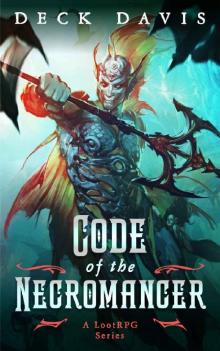 Code of the Necromancer
Code of the Necromancer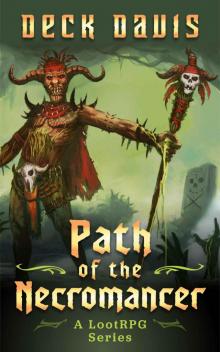 Path of the Necromancer Book 1 (A LootRPG Series)
Path of the Necromancer Book 1 (A LootRPG Series)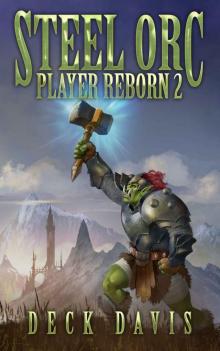 Player Reborn 2
Player Reborn 2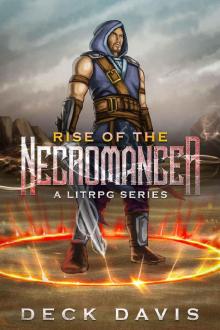 Rise of the Necromancer
Rise of the Necromancer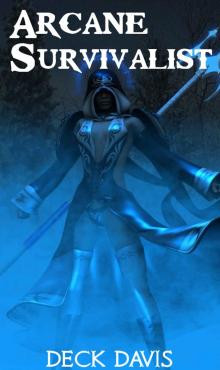 Arcane Survivalist: Apocalyptic Fantasy LitRPG
Arcane Survivalist: Apocalyptic Fantasy LitRPG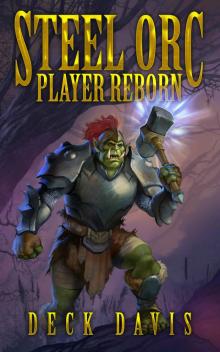 Steel Orc- Player Reborn
Steel Orc- Player Reborn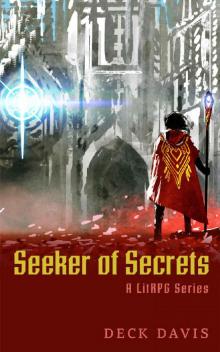 Seeker of Secrets
Seeker of Secrets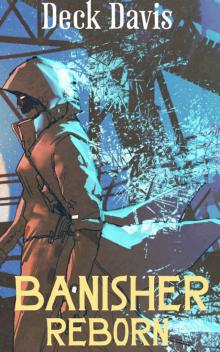 Banisher Reborn
Banisher Reborn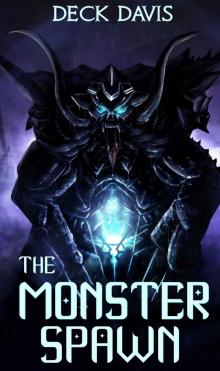 The Monster Spawn: A LitRPG Series (Adonis Rebirth #1)
The Monster Spawn: A LitRPG Series (Adonis Rebirth #1)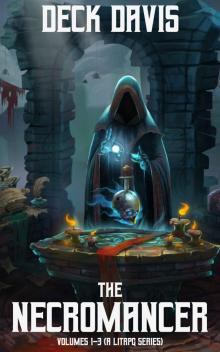 The Necromancer Series Box Set
The Necromancer Series Box Set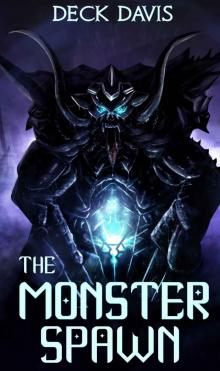 The Monster Spawn
The Monster Spawn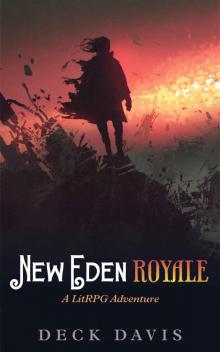 New Eden Royale: A LitRPG Adventure
New Eden Royale: A LitRPG Adventure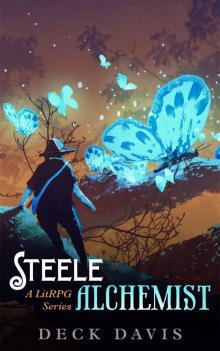 Steele Alchemist: A LitRPG Series
Steele Alchemist: A LitRPG Series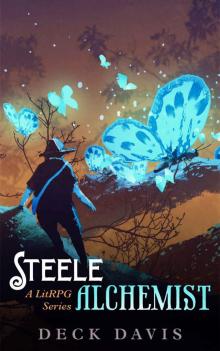 Steele Alchemist
Steele Alchemist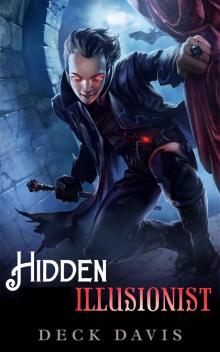 The Hidden Illusionist
The Hidden Illusionist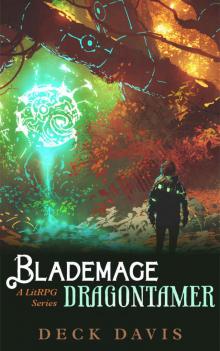 Blademage Dragontamer
Blademage Dragontamer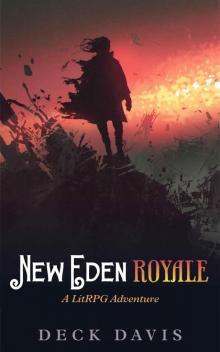 New Eden Royale
New Eden Royale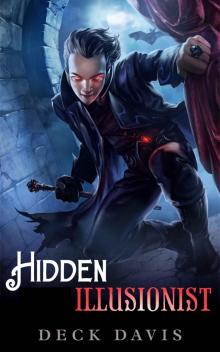 The Hidden Illusionist (Thieves of Chaos Book 1)
The Hidden Illusionist (Thieves of Chaos Book 1)